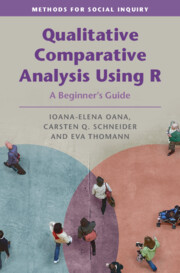6 - Post-QCA Tools
Published online by Cambridge University Press: 07 October 2021
Summary
It significantly strengthens the inferences drawn based on QCA results if we connect these results to theoretical knowledge and within-case evidence before, during, and after the analysis. In this chapter, we discuss two prominent tools of doing so after the analytic moment – set-theoretic theory evaluation and set-theoretic multi-method research (SMMR) – and demonstrate their implementation within R. Theory evaluation is a form of re-assessing theoretical hunches based on the results generated by QCA. While it can also be used for the identification of interesting cases for follow-up case studies, this task is better achieved with set-theoretic multi-method research. The latter is a tool for identifying typical and deviant cases for comparative or single within-case analysis.
Learning goals:
- Basic understanding of what theory-evaluation and set-theoretic multimethod research are.
- Familiarity with how to apply formal set-theoretic theory evaluation for re-assessing theoretical hunches based on the results generated by QCA.
- Familiarity with how to use set-theoretic multi-method research (SMMR) for the identification of cases for follow-up case studies after QCA.
- Ability to implement theory evaluation and SMMR in R.
Keywords
- Type
- Chapter
- Information
- Qualitative Comparative Analysis Using RA Beginner's Guide, pp. 172 - 200Publisher: Cambridge University PressPrint publication year: 2021



